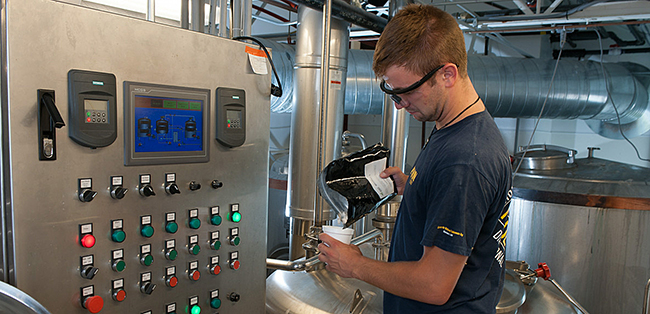 Ferris State University's Board of Trustees approved the Industrial Chemistry program,
with a concentration in Fermentation, during the May 2015. Below, pictured is Mark
Thomson.
Ferris State University's Board of Trustees approved the Industrial Chemistry program,
with a concentration in Fermentation, during the May 2015. Below, pictured is Mark
Thomson.
![]() VIDEO: Take a closer look at the Industrial Chemistry program, with a concentration
in Fermentation.
VIDEO: Take a closer look at the Industrial Chemistry program, with a concentration
in Fermentation.
After more than a half-century of offering an associate degree in Industrial Chemistry Technology, Ferris State University has established a Bachelor of Science program in Industrial Chemistry, in response to the growing demands of manufacturers, and the surging statewide interest in producing beers, wines and distilled spirits.
The first semester of Industrial Chemistry instruction, one that included a concentration
in Fermentation, is complete, according to associate p rofessor of Physical Sciences Mark Thomson. As a longtime participant in, and proponent
of home brewing, Thomson said that opportunities abound for those who learn to combine
carbohydrates to produce alcohol, and other products.
rofessor of Physical Sciences Mark Thomson. As a longtime participant in, and proponent
of home brewing, Thomson said that opportunities abound for those who learn to combine
carbohydrates to produce alcohol, and other products.
“I want to teach students how to make beer,” Thomson said. “The Michigan beer, wine and distillation industry is going crazy.”
Thomson said that as of 2013, only a handful of universities were offering degree programs that focused on brewing sciences, including University of California at Davis, Oregon State University, Colorado State University, and Appalachian State in North Carolina. Now, the number of schools where programs have begun, or are in the conceptual stage of developing instruction is closer to 20. Elsewhere in Michigan, Central Michigan University has a certificate of fermentation science that Thomson said is limited to beer, and Western Michigan University is affiliating with Kalamazoo Valley Community College, where a sustainable brewing program is in place.
While making beer may be an attractive calling card, to prospective Industrial Chemistry students, Thomson said that their Manufacturing concentration has been designed to respond to the needs of employers, in Michigan and elsewhere.
“There’s a recruiter from Michigan who serves on a program advisory board, who said he couldn’t come to Ferris to recruit anymore, because we didn’t offer a bachelor’s,” Thomson said. “Coca-Cola is close to producing a ‘Bio-Bottle’ that is wholly produced from corn sugars. A form of Lycra and Spandex is being produced, with 70 percent of the material coming from corn sugar. The supply of mid-range carbon chains are drying up, so making items from bio-materials is quickly becoming viable.”
Thomson added that the Kalamazoo-based pharmaceutical giant, Pfizer, will need analysts trained in industrial chemistry to assist their production of a generic statin drug, Zarator, as well as steroids and other injectable medicines.
“They’re using 150,000-liter tanks to produce these materials, and Pfizer will be after prospects who can analyze the materials as they are being processed,” Thomson said. “They’ll be counted on to assure both the quality, and capability of that base material. There are a whole lot of non-alcoholic applications for fermentation, and industrial production.”
Thomson said that Ferris’ program will require a 400-hour internship of its Industrial Chemistry BS students, and he is aware of opportunities, ranging from small businesses to corporations like Dow Corning that could provide those experiences.
“I know of four whiskey distillers, right now, who are looking for interns,” Thomson said. “When they leave Ferris, with their degree, our students will have good standards, and an understanding of what’s required to succeed in the industry.”
As the 2015-16 academic year began, Thomson said that they received their first declarations for a Bachelor of Science in Industrial Chemistry, with several students intending to change programs. He estimated that there were 30 to 40 students currently pursuing associate degrees in Industrial Chemistry Technology, and within five years, the BS degree with a concentration in Fermentation Science should have at least 20 students. He believes freshmen who come to Ferris, starting in other academic programs, may find a fulfilling and interesting career, if they are willing to consider a change.
“It’s important that they be made aware of the possibilities available in Industrial Chemistry,” Thomson said.
Thomson anticipates the growth in students pursuing a bachelor’s degree in Industrial Chemistry will increase by “5 to 10 students a year.”
“I go back to the famous Oliver Wendell Holmes quote, ‘A mind stretched by a new idea, never returns to its original shape,’” Thomson said. “I will talk to anybody almost anytime, parents, students, anyone, about the opportunities available through this program.”
Click Industrial Chemistry/Fermentation Science to learn more about the program as it was approved by the Board of Trustees, in May 2015.

